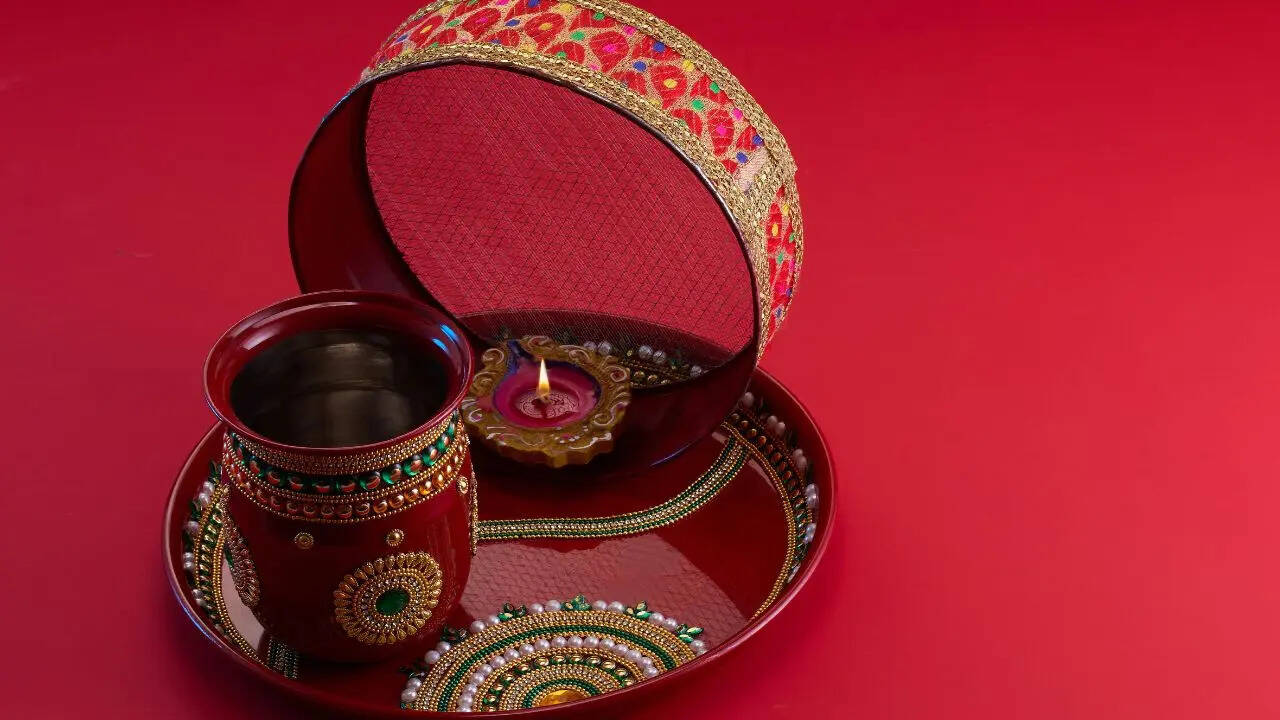Lifestyle
Unmarried Women Embrace Karwa Chauth Fasting Traditions

The festival of Karwa Chauth, celebrated on October 10, 2025, is a significant occasion in India, primarily observed by women praying for the long life of their husbands. Traditionally, this involves fasting from sunrise to moonrise, culminating in rituals that include looking at the moon and their husband’s face through a sieve. While the festival centers around married women, an increasing number of unmarried women are choosing to participate, marking a shift in the cultural landscape.
Celebrated mainly in Northern India, including states like Himachal Pradesh, Uttar Pradesh, Punjab, Delhi, Haryana, and Rajasthan, Karwa Chauth is also known as Karak Chaturthi. The festival falls on the fourth day of the full moon and is steeped in rituals that reflect devotion and spiritual significance.
Unmarried Women and Their Unique Observances
For unmarried women, the observance of Karwa Chauth takes on a different meaning. Instead of praying for a husband’s longevity, they focus on seeking a suitable life partner or simply cultivating happiness in their lives. The rituals for unmarried participants differ slightly; while married women typically break their fast upon seeing the moon and their husband’s face, unmarried women look at the moon and then at the star Arundhati.
The fasting rules for unmarried women are also more flexible. They are permitted to follow a fruit fast rather than abstaining from all food and drink. This approach allows them to consume energy-boosting foods or drinks before dawn, which is an important aspect of their observance. Since unmarried women do not receive sargi—a pre-dawn meal traditionally shared by married women—they are not obliged to follow the more stringent Nirjala fast.
Guidelines for Observing the Fast
If you are an unmarried woman planning to fast this Karwa Chauth, several guidelines can help you navigate the day. It is vital to participate in the evening puja, as attending or performing this ritual is considered auspicious. Additionally, you should avoid heavy physical activity and remain indoors as much as possible to maintain your energy levels.
As the fast concludes, unmarried women can break their fast by offering Arghya to the stars, a practice that is distinct from the moon-based rituals of married women. The emphasis remains on spiritual cleansing and connection, making the experience both meaningful and personal.
In summary, the evolving traditions of Karwa Chauth reflect a broader cultural change, as more unmarried women engage with the festival’s rituals. This shift not only enriches the observance but also highlights the diverse interpretations of faith and spirituality within contemporary society.
-

 World5 months ago
World5 months agoSBI Announces QIP Floor Price at ₹811.05 Per Share
-

 Lifestyle5 months ago
Lifestyle5 months agoCept Unveils ₹3.1 Crore Urban Mobility Plan for Sustainable Growth
-

 Science4 months ago
Science4 months agoNew Blood Group Discovered in South Indian Woman at Rotary Centre
-

 World5 months ago
World5 months agoTorrential Rains Cause Flash Flooding in New York and New Jersey
-

 Top Stories5 months ago
Top Stories5 months agoKonkani Cultural Organisation to Host Pearl Jubilee in Abu Dhabi
-

 Sports4 months ago
Sports4 months agoBroad Advocates for Bowling Change Ahead of Final Test Against India
-

 Science5 months ago
Science5 months agoNothing Headphone 1 Review: A Bold Contender in Audio Design
-

 Top Stories5 months ago
Top Stories5 months agoAir India Crash Investigation Highlights Boeing Fuel Switch Concerns
-

 Business5 months ago
Business5 months agoIndian Stock Market Rebounds: Sensex and Nifty Rise After Four-Day Decline
-

 Sports4 months ago
Sports4 months agoCristian Totti Retires at 19: Pressure of Fame Takes Toll
-

 Politics5 months ago
Politics5 months agoAbandoned Doberman Finds New Home After Journey to Prague
-

 Top Stories5 months ago
Top Stories5 months agoPatna Bank Manager Abhishek Varun Found Dead in Well









